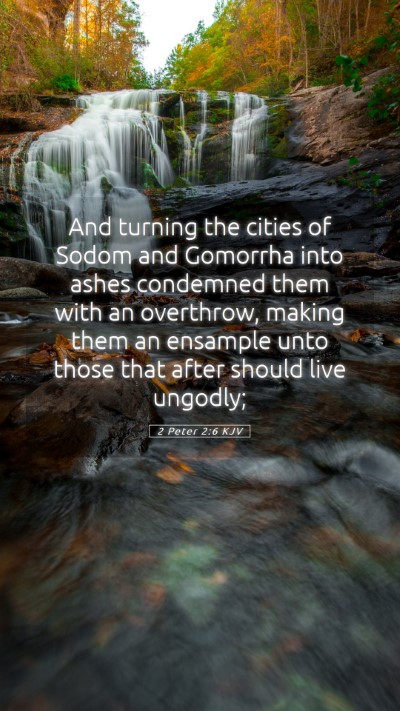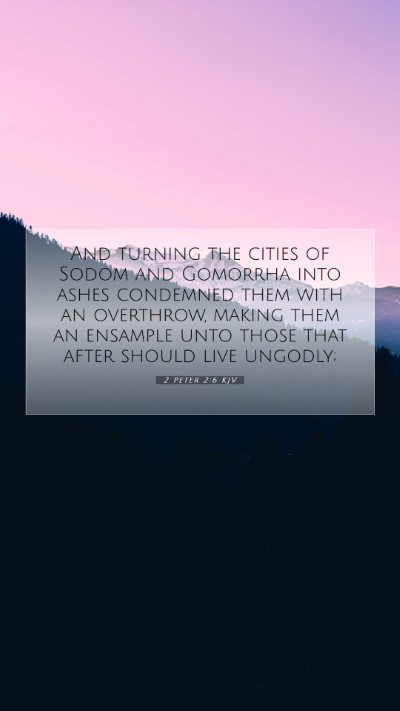Old Testament
Genesis Exodus Leviticus Numbers Deuteronomy Joshua Judges Ruth 1 Samuel 2 Samuel 1 Kings 2 Kings 1 Chronicles 2 Chronicles Ezra Nehemiah Esther Job Psalms Proverbs Ecclesiastes Song of Solomon Isaiah Jeremiah Lamentations Ezekiel Daniel Hosea Joel Amos Obadiah Jonah Micah Nahum Habakkuk Zephaniah Haggai Zechariah Malachi2 Peter 2:6 Meaning
What is the meaning of 2 Peter 2:6?
And turning the cities of Sodom and Gomorrha into ashes condemned them with an overthrow, making them an ensample unto those that after should live ungodly;
2 Peter 2:6 Bible Verse Meaning
Understanding 2 Peter 2:6: A Comprehensive Commentary
2 Peter 2:6 states: "And turning the cities of Sodom and Gomorrah into ashes condemned them with an overthrow, making them an ensample unto those that after should live ungodly;" This verse serves as a potent reminder of God's judgment against sin and the consequences of ungodly living. Below, we explore the meaning and implications of this scripture through insights drawn from prominent public domain commentaries by Matthew Henry, Albert Barnes, and Adam Clarke.
Summarized Insights from Commentaries
Matthew Henry's Commentary Insights
Matthew Henry emphasizes the historical account of Sodom and Gomorrah as a vivid illustration of God's justice. These cities, known for their wickedness, were destroyed not merely for their immorality but as a divine warning for future generations.
- Divine Judgment: Henry asserts that God's judgment was both necessary and instructive, serving as an example for those who might follow in similar ungodly paths.
- Essence of Example: The destruction of these cities is portrayed as “an ensample,” meant to instill fear and caution against sin, thereby urging believers to embrace righteousness.
Albert Barnes’ Commentary Insights
Albert Barnes elaborates on the message of accountability in this verse. He notes that the fate of Sodom and Gomorrah was not merely retribution, but also a demonstration of God's unwavering opposition to sin.
- Preservation of the Righteous: Barnes draws a parallel between the destruction and the preservation of the righteous, emphasizing that while God judges the wicked, He ensures the safety of those who follow Him.
- Universal Application: Barnes applies the lesson to all generations, signaling that the exemplary fate of Sodom and Gomorrah serves as a timeless warning against living in rebellion to God’s commands.
Adam Clarke’s Commentary Insights
Adam Clarke focuses on the implications of this scripture within the broader biblical narrative. He points out that the destruction represents a clear departure from God's mercy when sin reaches its zenith.
- Hope for Repentance: Clarke asserts that this story should prompt reflection on God’s patience and grace before delivering judgment, reminding readers of the opportunity for repentance.
- Symbolism of Ashes: The imagery of Sodom and Gomorrah turned into ashes symbolizes total separation from God and stands as a stark warning of the permanence of divine judgment.
Bible Verse Explanation
In explaining the verse, it is crucial to note that Peter uses these historical cities as a symbol of the ultimate judgement awaiting those who continue in ungodliness. The fire and brimstone that leveled these cities serve not only as a historical event but also as a theological lesson empowering believers to remain vigilant in their faith.
Significance in Today’s Context
Understanding 2 Peter 2:6 helps the contemporary believer to recognize the importance of obedience and the seriousness of sin. In an age when moral values are often blurred, this passage calls for a return to strict adherence to God’s commands as a foundation of faith.
Cross References
- Genesis 19:24-25 - The account of Sodom and Gomorrah’s destruction.
- Jude 1:7 - Refers to Sodom and Gomorrah as examples of divine judgment.
- Romans 1:18 - Discusses God’s wrath against ungodliness.
Conclusion
In conclusion, 2 Peter 2:6 serves as a powerful reminder of God's justice and a call to believers to pursue holiness while warning against the consequences of unrighteous living. By studying this verse and its context, individuals can gain deeper insights into biblical truths and apply these principles to their lives. Engaging with these commentaries can enhance understanding and facilitate meaningful discussions in Bible study groups or online Bible study sessions.


